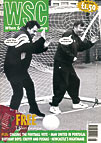 Hugh McIlvanney's tribute to a trio of famous managers struck a chord with Roger Titford
Hugh McIlvanney's tribute to a trio of famous managers struck a chord with Roger Titford
Over the Easter weekend, as a welcome antidote to the usual highspeed Sky blather, Hugh McIlvanney presented a documentary trilogy on the backgrounds and careers of Matt Busby, Bill Shankly and Jock Stein. A different era and a different tempo.
Though sentimental and over-indulgent in places – notably in McIlvanney’s apologetic one-twos with his brother – the series was overall very worthwhile and watchable. For three hours and more it continually reminded the viewer of the huge chasm between football of only a generation or two ago and today. Nothing typified this better than the look on lan St John’s face when he revealed that his wage as Liverpool’s centre forward more than 25 years ago was just £40 a week; baffled but not bitter.
Here was the lost world of football puritanism where Shankly wanted to put players in jail for not trying, as vanished as the mining village that was his birthplace and now nothing but grassy moorland. The sense of distance was enhanced by Mcllvanney’s cinematic approach: Raging Bull meets Arthur Hopcraft, lightly seasoned by autobiographical sociology. And why not? It was a change from endless goals and also a triumph for the film researchers. (I’ve never seen a full Aldershot ground before.)
The way of life in the west of Scotland coalfields, Mcllvanney’s thesis went, must have had some peculiar characteristics such that it could have given rise to three managerial paragons such as these. But did it also not give rise to George Graham and to footballers by the thousand who never made a lasting mark? What about the Middlesbrough of the 30s that gave us both Clough and Revie? Thesis or Coincidence? If the thesis was necessary to get the BBC to make the programme it was a fair exchange.
The compelling material was in the detail of what they did rather than where they were from; Stein jumping into the players’ bath fully-clothed just to pursue a furious argument with Billy McNeill at close quarters, Shankly apparently putting his Workington players on some speed-like substance in the 1950s (McIlvanney looked as uncomfortable as Richard Keys at that moment) and Busby, well there were no big jokes. Sir Matt came across as one of those rare individuals in whom are combined physical, intellectual and moral authority, in whom the less blessed put their trust, a man wronged by fate but strong enough to overcome all the same, a potential statesman who, by dint of his background, became instead a mere football manager.
Even though McIlvanney was closer to Stein than the others his character was the least well-defined: shrewd, bearlike but somewhat bleak. The star was the obsessive, vulnerable Shankly, a footballing Peter Pan still at the age of 60 outjumping 9 year-olds in the local park. Mcllvanney defined rather than explored their approaches to football management. Stein apart, they were traders and motivators of players rather than coaches. He made the good point that they had important experiences to draw upon in life outside football (the mines, the War) unlike today’s managers
There was surprisingly little on the relationships between the three men themselves. Were they close friends, a recognisable Scottish in-crowd from which the likes of Revie, whose name was never once mentioned, were excluded? Knowing who was mates with whom, and who wasn’t, can explain much that happens in football.
For those of us who experienced the era of these managers ‘live’, as it were, no programme like this is likely to be long enough and this show was worth a dozen Ford Monday Night Footballs. But do their stories, as familiar as lives of the saints to my generation, have any meaning or interest for those under 25 on the modern side of the chasm?
From WSC 123 May 1997. What was happening this month